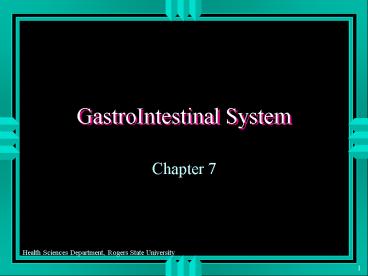GastroIntestinal System PowerPoint PPT Presentation
1 / 35
Title: GastroIntestinal System
1
GastroIntestinal System
- Chapter 7
2
Student Objectives
- Explain the main functions of the
gastrointestinal system. - Identify the main organs and accessory organs.
- Explain the role of the liver and gallbladder in
digestion.
3
Student Objectives
- Identify combining forms, suffixes, and prefixes
related to the GI system. - Discuss pathology related to the GI system.
- Identify diagnostic, symptomatic, and therapeutic
terms related to the GI system. - Identify abbreviations and pharmacology related
to the GI system.
4
Anatomy/Physiology
- Responsible for the intake, digestion of food,
absorption of nutrients, and elimination of solid
waste. - Alimentary Canal (GI tract)
- Aliment/o - to nourish
5
Accessory Digestive Organs
- Teeth
- tongue
- salivary glands
- liver
- gallbladder
- pancreas
6
Oral Cavity
- Mouth (bucca, tongue)
- papillae
- Teech
- mastication
- dentin
- pulp
- gingiva
7
Teeth
- Maxillary arch (upper)
- Mandibular arch (lower)
- anterior teeth for biting and tearing
- posterior teeth for chewing and grinding
- dent/i - teeth
- decidu/o - shedding
- Primary - 20 teeth
- Permanent - 32 teeth
8
Oral Cavity
- Palate, hard and soft
- bolus
- Pharynx
- Uvula
- Esophagus
- Epiglottis
9
Esophagus
- Gullet
- chyme
- cardiac, or lower esophageal or
gastroesophageal sphincter
10
Stomach
Fundus
- Body, fundus
- pylorus
- rugae
- pyloric sphincter
Body
11
Small Intestine
- small bowel
- enter/o - small intestine
- villi
- Parts
- duodenum
- jejunum
- ileum
- ileocecal valve
12
Large Intestine
- Large Bowel
- col/o or colon/o
- cecum
- vermiform appendix
13
- Colon
- ascending
- hepatic flexure
- transverse
- splenic flexure
- descending
- Sigmoid
- Rectum
- Anus
14
Liver - hepat/o
- Functions
- production of bile
- glucose - glycogen
- storage of vitamins, B12, A, D, E, K
- erythrocytolysis (pigment released eliminated in
bile called bilirubin) - bilirubin gives stool its characteristic dark
color - removes toxins from blood
- manufactures blood proteins
15
Pancreas
- internal - endocrine function
- insulin
- glucogon
- external - exocrine function
- amylase - carbohydrates
- trypsin, chymotrypsin - proteins
- lipase - fats
- enzymes inactive until reach duodenum
16
Gallbladder
- pear-shaped sac under the liver
- chol/e means bile or gall
- cyst/o means cyst or sac
- gallbladder contracts forcing bile out cystic
duct into common bile duct.
17
Bile
- bile is a digestive juice- emulsifier acts on fat
in a way that lipid enzymes can digest fat - travels via hepatic duct to cystic duct to gall
bladder, where stored - bile consists of water, bile salts, cholesterol,
and bilirubin (a colored substance resulting from
breakdown of hemoglobin) - bilirubin gives bile yellow or orange color
18
Stomach during Digestion
- Gastric juices
- HCL - activates enzymes
- protease
- pepsin
- lipase
- Chyme
19
Small Intestine during Digestion
- digestion completed in small intestine
- chyme mixed with bile and pancreatic juices
- emulsification
- absorption
20
Large Intestine
- receive fluid waste products and store until
released from body. - excess water absorbed
- feces, stools
- defecation, or bowel movement
21
Pathology - Ulcers
- Gastric ulcers
- Peptic ulcers
- Ulcerative Colitis
22
Pathology - Hernias
- Diaphragmatic
- Hiatal, Gastroesophageal
- Inguinal
- Umbilical
23
Bowel Obstructions
- Volvulus
- Ischemia
- Necrosis
- Peritonitis
- Intussusception
24
Hemorrhoids
- Internal
- External
- Hemorrhoidectomy
25
Liver Disorders
- Yellow skin - jaundice, icterus
- Hepatitis
- Type A - fecal, oral
- Type B - parenteral, sexual, perinatal
- Type C - parenteral to blood, blood products
26
Diverticulosis
- Diverticulitis
- obstipation
- diverticulectomy
27
Oncology
- Neoplasn from epithelial lining
- gastric adenocarcinoma
- esophageal carcinomas
- hepatocellular carcinomas
- pancreatic carcinomas
28
Diagnostic, Symptomatic, Therapeutic Terms
- Aerophagia
- anorexia
- appendicitis
- ascites
- borborygmus
- bulimia
29
Diagnostic, Symptomatic, Therapeutic Terms
- cachexia
- cholelithiasis
- cleft palate
- Crohns disease
- cirrhosis
- colic
30
Diagnostic, Symptomatic, Therapeutic Terms
- deglutition
- dysentery
- dysphagia
- eructation
- fecalith
- flatus
- gastroesophageal reflux disease
31
Diagnostic, Symptomatic, Therapeutic Terms
- Halitosis
- hematemesis
- irritable bowel syndrome
- leukoplakia
- malabsorption syndrome
- melena
- obstipation
32
Diagnostic, Symptomatic, Therapeutic Terms
- Peristalsis
- pyloric stenosis
- regurgitation
- steatorrhea
- visceroptosis
33
Abbreviations
- Ac
- bid
- hs
- NPO
- pc, pp
- PO
- PRN
- qam, qm
- qd
- qh
- q2h
- qid
- qod
- qpm, qn
- stat
- tid
34
Diagnostic Abbreviations
- ABC
- alk phos
- Ba
- BaE
- Dx
- EGD
- FBS
- GB
- GTT
- IVCPUD
- SGOT
- UGI
35
Other Abbreviations
- BM
- GERD
- GI
- HAV
- HBV
- IBS
- IV
- LLQ
- LUQ
- PE
- PMH
- RUQ

